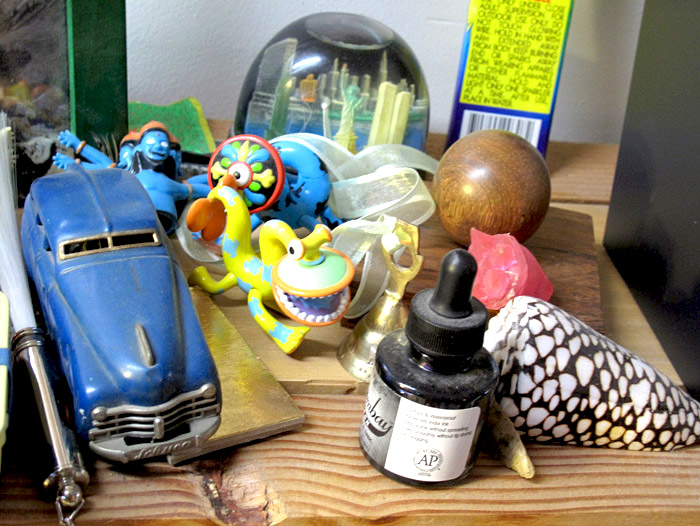
Deepscreen
by Marc Laidlaw

The rain at SeaTac was torrential. He kept worrying they wouldn’t let the plane land, but apparently the weather was nothing unusual. They actually touched down three minutes ahead of schedule, and as soon as the plane was docking, he pulled out his phone and tried the number Michelle had given him.
“You’ve reached Clay Garson of Garson Construction. Please leave your name and I’ll get right back to you.”
Jesus. She had given him the boyfriend’s number. He decided not to leave any message. He had the name of the hospital, and they had his number in case anything changed.
Leaving the airport was the usual hassle—maybe a bit worse than usual because he’d brought a duffel bag along, a cheap promotional nylon thing with a demon face embroidered on one end. The guards scrutinized the litter of mismatched socks, underwear, and assorted black T-shirts whose fadedness was a measure of the obsolescence of the products they advertised.
“Peter Gass?” the agent asked, passing his card through the scanner, as if there was any possibility of misidentification. Peter’s face and vitals stared back at them from the flickery deepscreen monitor next to the interstate customs desk. “How long are you in Seattle?”
“I don’t know exactly.”
The guard gave him a look that was both bored and suspicious. “I don’t see a toothbrush. Or a razor. Is this a day trip?”
“Look, my son is in the hospital—I just threw some stuff in a bag and caught a plane. I didn’t have time to pack.”
The guard’s expression softened a bit. “He okay?”
“I…I don’t know. They thought it was appendicitis, but there seems to have been some complication. Please…”
“What hospital?”
“I don’t…” He dug in his pocket for the card on which he’d scrawled the name.
“You can get a cab right outside those doors,” the guard said, pointing through the murk of the terminal. “Shouldn’t take you more than twenty minutes to get there. Hope everything turns out okay.”
Peter realized the man was pushing his duffel bag back at him, zipping it shut. He grabbed it, said his thanks, and hurried toward the exit doors. There was a long line of cabs parked under a cement overhang, just out of the rain. He slid into the nearest, gave the name of the hospital, then sank back into the seat. It was damp from some recent passenger.
The driver was an elderly woman, shapeless sweatshirt, coarse grey hair pulled back from thick horn-rims.
“Mudslide took my son in law’s house this morning,” she remarked. “Said they thought the train had jumped its track. Came right through their back wall and didn’t stop there. They were eating Sunday breakfast in the dining room; that’s what they do on Sundays. Fresh waffles and whipped cream. If it’d been a weekday, they’d’ve been eating cold cereal in the breakfast nook at the back of the house. And I wouldn’t be a grandmother at this moment. I wouldn’t be at work, either. I’d be digging my family out of mud.”
“My son’s in the hospital,” Peter blurted.
“Well bless your heart. I hope it’s nothing serious.”
“Appendicitis. But, you know, these bugs today…a simple little thing can get bad in a hurry. I had mine out when I was twenty. Hurt like hell but I never feared for my life. But now this…my son…”
“You must’ve rushed home from a business trip.”
“I don’t live here. Came up from San Francisco. He’s with my ex-wife. And her…” He trailed off. That was more than she needed to hear.
“We’ll lick those bugs,” she said. “It’s a whole different approach is what’s needed. They can outwit any pharmaceuticals you care to name, but they won’t be expecting a paradigm shift. You can’t beat that by mutating.”
“You might be right,” Peter said.
“Better believe it.” She whistled. “Tomorrow makes a hundred days of rain. Usually we’re good, it’s no big deal, but after a hundred days…well…there are side effects. I still prefer it to drought. Then again, my son-in-law sees things differently right now.”
“How much farther?” he asked. He could hardly see the traffic around him in the seething rain. He felt she was driving much too fast for the weather. But he was glad for that. It made him feel as if he were getting somewhere finally.
“Fifteen minutes? Twenty tops.”
It was closer to thirty. As the cab pulled into the looping driveway of the hospital, Peter handed over his ubiqard and winced, half expecting it to deny the transaction as she fed it into the dashboard reader. When the dashboard bleeped its approval, he sighed with relief.
“Hope everything turns out okay,” said the driver. “You get going now.”
“Thanks.”
The car steamed away on the wet drive. The rain had stopped. Around him, wet grey towers and dripping streetlights. He hurried through the doors into the hospital.
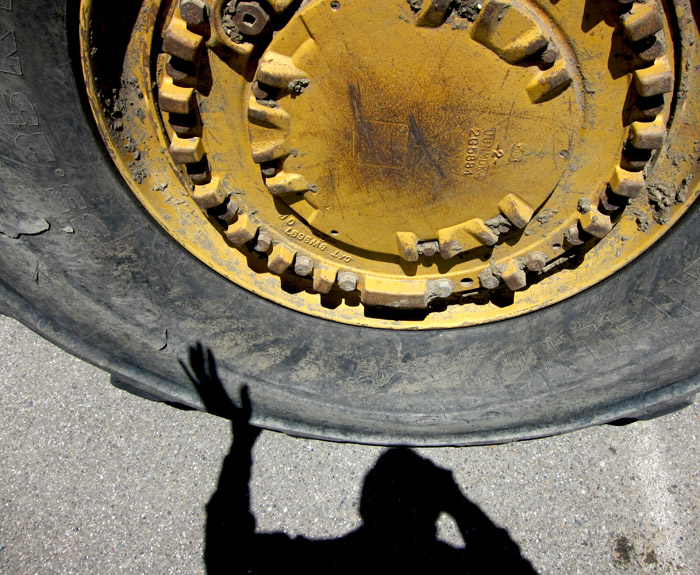
It looked like a hotel, or a mall, curving ramps and several open sales counters selling mylar balloons, flowers, snacks. At the reception desk, he gave Al’s name to the directory, and it asked to see his qard. Apparently he was on the visitor list. A map of the hospital flared in 3D, showing Al’s room as a lighted cube with two beds in it. Repeating the number over and over to himself, he headed for an elevator.
At the floor entry, he had to submit his qard for scanning all over again. Then a nurse led him to the room. Through the open door he could see two beds, the farthest one partially curtained off. At the nearest stood his ex-wife, Michelle. Next to Michelle, with a huge hairy hand on her shoulder, stood a stocky man with a brushy black moustache and close-cut hair like a fused shell or helmet. Clay Garson, I presume. He had to get past the whole idea of Clay Garson in order to focus on what mattered:
There, in the bed, his son. Alan. Pale and pained, wearing a faint smile that widened when he glanced over and saw Peter coming into the room.
“Dad!”
Al’s greeting drew him to the bed. For a moment, he could safely ignore the other two. He put his hand on Al’s forehead as if checking for a light fever; and in fact, the boy was warm. He bent and kissed his son’s brow.
“How you doing, Al? I got here as soon as your mom called me. You…you still got that appendix?”
“Yeah, Dad. They’re…gonna come get me soon though.”
“Unless they put it off again,” Michelle said.
“Al’s been a real trooper through the whole thing.”
That was Clay. Peter tried to keep his face expressionless as he turned and finally acknowledged the man. He put out his hand, and it was duly squeezed. Thick calluses scraping his own soft palms told him more about Clay Garson than he really wanted to know.
“We’re glad you could make it, Pete. You have any trouble getting here?”
“Clay…” Michelle pulled him gently to one side, and put herself in his spot. “I want to talk to Pete alone for a minute. Let’s step out, Pete.”
“Are you here to stay, Dad?”
“Sure,” Peter said. “I’m not going anywhere. Just out in the hall to talk to your mom for a few minutes. We have some catching up to do.”
“I’ll keep you company, buddy-boy,” Clay said. “Let’s see what’s on TV, okay?”
There were several chairs at one end of the hall, below a window that looked out at a parking lot with a bright expanse of mall beyond it. There was a drab fluorescent marquee covered with shop names, and as he read them, he suddenly saw himself floating there in the dark glass, the ghostly mirrored corridor behind him.
Michelle dropped down in a chair, gnawing her thumbnail.
“You look like shit,” she said.
He sank down a decorous distance away from her. “Uh huh. And what else?”
“I told you, you didn’t have to come.”
“I wanted to come. If I were him, I’d want me here. I’d be pretty upset if my own dad didn’t come to see me in the hospital.”
“He would understand that you live far away and you don’t exactly have the money to be flying around.”
“You tell him that? That I don’t have any money?”
“It’s not exactly a secret that you can’t keep up on child support. Yet somehow you managed to get a plane ticket and, I assume, a cab ride out here.”
“As soon as you accept credit cards, you can be in the same position as the airlines and the cab companies.”
“That’s not a bad idea.”
“What about this infection?”
“They’re…treating it with IV, and hoping it’s not some resistant strain. They’ve actually put off surgery twice now because of it.”
“Twice? How long has he been in here?”
“Since yesterday morning, I told you that on the phone.”
“Two days? And you waited till this afternoon to call me?”
“It’s been extremely stressful. My immediate problems…they’re what I have to take care of first, Peter. Not you. You’re not first in line at this point.”
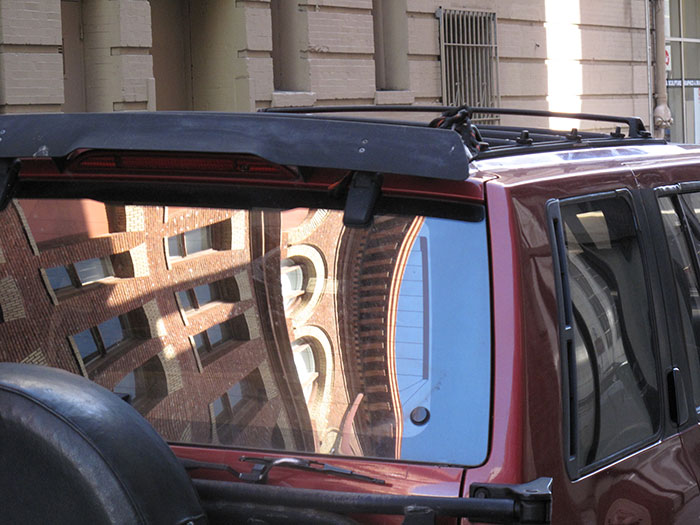
Suddenly a wail of pain reached Peter, striking him in the gut as if it were his own. He hadn’t heard that cry in years, but it brought back every thrill of parental horror he’d ever felt when the three of them were together: high fevers, vomiting, bloody fingers. He was on his feet and back in the room in seconds.
“It comes in waves,” Michelle said, crowding up to the bedside next to him. “There, there, baby. It’s okay. They’re coming for you soon.”
Al’s eyes were shut, his teeth clenched in a grimace, all the braveness gone out of him. He was just a child now, wailing and in pain, and beyond Peter’s power to help him. His own sense of helplessness was overwhelming.
“I’ll go see what the hell is taking them so long,” Clay said, stalking out of the room.
“It hurts…it hurts so bad…”
“I know. I know, Al. I remember exactly.”
Al’s brow furrowed up. “You do?”
“It wasn’t all that long ago. A few years before you were born. Right, Michelle?”
He glanced over, discovered that she had gone after Clay. He could hear her voice somewhere down the hall, lashing out at one of the nurses no doubt. And Clay trying to quiet her.
Good luck, he thought. Then he felt a pang of shame, because she didn’t deserve such thoughts. If she treated him with bitterness now, it was his fault. He hadn’t done much to prove himself worthy of anything else. Especially not from her.
“I’m sorry I didn’t know sooner, Al,” he said. “I’d have come yesterday if I knew.”
“That’s okay, Dad. I wondered if you were coming. I’m glad you’re here.”
“You can’t eat, can you? Can’t keep anything down?”
He shook his head. “Even water makes me throw up. They…they put these tubes in my arms now, I guess it’s sugar water or something, so I’m not starving…but it’s weird, I haven’t eaten for two days but I’m not hungry.”
“You, skipping a meal? That’s weird all right. I think I can hear your stomach rumbling though.”
Al started to smile, then he closed his eyes and put his head back again, and just moaned. Peter squeezed his hand and waited for the wave to pass.
“Dad…you’re not going away again are you?”
“Not right away, no. I’m sticking around to make sure you’re okay.”
“No, I mean…after that.”
“Oh. Al, I…I don’t have much choice.”
“Why do you have to live so far away?” The boy’s eyes teared up.
“I can’t afford to move, Al. I can scarcely afford to stay where I am.”
“If you had a job up here would you? Clay always says he could use extra hands. Maybe he…maybe he’d hire you.”
Peter laughed in spite of himself. “Well, that’s not going to happen.”
“Why not, Dad?”
“It’s just not.”
Al’s lips tightened. He began to moan, and this time it came with tears.
“Oh God, Al…” He leaned over the boy, wishing he could share the pain, to take some of it away from his son.
Footsteps behind him.
“Good news, Al,” said Clay. “They’re on their way.”
Beyond Clay the contractor, two nurses were pushing a stretcher into the room, followed by Michelle.
“Get out of the way,” she told the men. “Can’t you see they need to get in there?”
They moved back from the bed as the aides rolled the stretcher into place. Clay and Peter both glanced at each other, linked for the moment by Michelle’s annoyance—as if they were members of a single insubordinate unit.
“He’s gonna be fine,” Clay said.
“I’m sure. It’s just appendicitis. Everyone one gets it.”
Clay shrugged. “I never did.”
“Well, something to look forward to then.”
Clay stared at him.
“I’m kidding.”
“I know. Just testing you. I’m sorry we had to meet under these circumstances. Al talks about you all the time. It’s too bad you’re so far away.”
“Clay?” Al said, from the stretcher. “Would you give my Dad a job?”
“Please, Al,” Peter said.
“A job?” Michelle said. “What are you talking about?”
“I don’t think your dad wants to get his hands that dirty, Al.” Clay winked at Peter. It was small relief.
“You ready?” the nurses asked. “Just lie back now.”
Peter stepped in front of the stretcher and gave Al’s hand a squeeze. “Okay,” he said, “I’ll be here when you get out.”
“You promise?”
“Promise.”
He stepped away to let Michelle in. “I’m going with him,” she said. “As far as I can.”
“Where do you want us?” Clay asked.
“You can stay if you want. Keep Pete company.”
And then she was off…down the hall with the stretcher. Peter watched them all the way into an elevator, then the doors closed.
“Uh…you know what? I…I think I’m going to stretch my legs. I’ve been on a plane, in a cab, haven’t eaten yet…”
“Well, there’s a mall just down the hill, you can get just about anything you want down there. I think I’ll, uh, stay here and just wait for Michelle. I hope you don’t mind.”
“Not at all. See you.”
He stopped himself from saying “Nice to meet you” since that sounded too final, and he wasn’t through seeing Clay this evening—not by a long shot.
It wasn’t hard to find his way to the mall. The rain had started up again, but there were covered walkways most of the way there. He dashed across the street from the hospital, crossed an acre of mall parking, and found himself in a run-down building that looked less like a mall than the hospital lobby. Actually, it looked like the malls from his childhood: Dingy yellow walls, linoleum flooring, faded signs, and cages pulled down across most of the storefronts. A security guard loafed on a couch that looked a quarter mile distant. Near the entrance was a coffee shop, dark and almost empty. He moved in and took a seat at the counter, ordered coffee and a burger, and ate without tasting it, without thinking a single clear thought, overwhelmed by the emotional rush of the last few hours. He handed his Ubiqard to the waitress so that she could bring him a bit closer to the ultimatum. Then, after swilling another mouthful of tepid but strong coffee, he swiveled out of his seat and went back into the dull corridor.
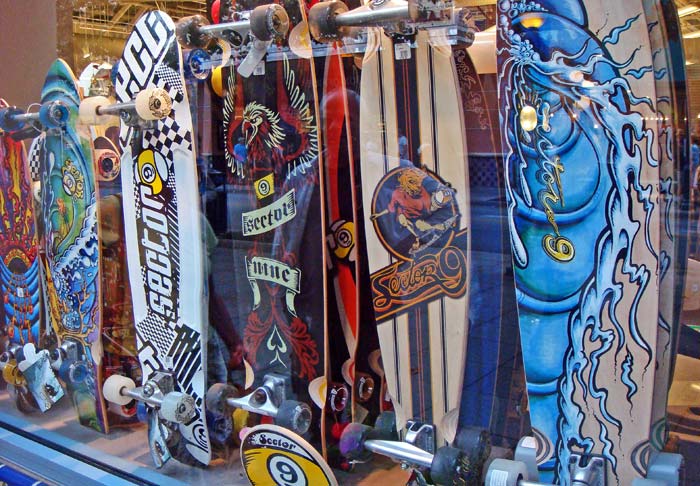
For a moment, unpleasant and unwelcome thoughts and feelings surged menacingly near the surface of his mind. Al and Michelle and Clay. He didn’t belong here, even though he had his role to play. Remembering Al’s pleas on his behalf, he put his finger on what he’d been feeling.
Shame.
What kind of father was he?
Michelle’s remark about child support…telling Al that he couldn’t afford, well, anything…Al lying for two days in agony without his father by his side to hold his hand and reassure him all would be well…
He sighed. Then heard a sound he hadn’t thought to hear here. His pulse thrilled, pushing back the feeling of shame, replacing it with something closer to ecstasy.
Gunfire.
He looked both ways. The security guard was gone. But near the tattered couch, one of the mall shops was open, the cage not yet pulled down. Light danced on the bare windows. The shop bore no marquee. The closest thing it had to a sign were a handful of hand-lettered notices taped up inside the window. He walked closer to read them, but didn’t need to once he had a look inside the space.
Rows of deepscreens, each one seeming to open up into a dimension larger than the case that held it. All colors of light coming out of them, flashes and sparks of gunplay, fireworks, golden and green sunsets. He felt himself getting hot, nerves jangling, and a warm anticipatory glow spread through his loins. For a moment he saw Michelle’s face, crushed with disappointment; he heard his promise to Al echoing back from the hospital. “I’ll be there when you come out.” He would still keep that promise. Sure. A promise was a promise, especially now.
He stepped through the door. Most of the sets were occupied, but there were a few in a corner at the back of the room, grey with the liquid light of inactivity.
His problems really weren’t so bad. It was only appendicitis, after all. He had survived that and Al would too. Plenty of kids came from broken homes. He had! And Clay, on first impression, could have been worse. Much worse.
There was really nothing he needed to run from.
In a way, that made this easier. It made it okay. It wasn’t the old pattern after all, because he wasn’t escaping anything. He was dealing with the feelings of shame, the bad father thing; he was working those out. So, this wasn’t a way of escaping from that. This was just…a way to pass some time.
Don’t fool yourself.
Shut up.
He flicked the Ubiqard against his thumbnail, making a little nervous rhythm, as he pulled back the seat at the very last station. He sat down, flick-flick-flick, flick-flick-flick, flick-flick-flick-flick…William Tell Overture…and found the ubislot on the underside of the console by feel (they were always in the same spot in these stations) and gently rested his card at the edge of the cold plastic mouth.
Last chance.
What am I doing?
He pinched at the edge of the card, suddenly terrified of how thoroughly he had deluded himself, after all the work he’d done, the time he’d spent in recovery…
What am I doing?
But it was too late. The card slid into the slot as if it had been greased. The machine yanked it from his fingers. And instantly a light dawned in the deepscreen, a sun was rising in there. The sun was like a wormhole in space. It was a hollow tube, a clever sunserpent with its hollow guts winding all the way back to infinity. And it saw him. The questing beast had found him again, at last, after all this time. It was as if they had never been apart.
Imagine standing on a sea cliff at sunrise as the sun comes up over the ocean. Imagine that the sun, the closest and most powerful force of nature visible from Earth, suddenly unfolds from within, opens like an eye, and looks directly at you. Opens like a mouth and sings your name. Reaches out like a snake like a straw and sucks out your soul and whisks you away…
Hello, Peter, the sunsnake, the empty hollow sucking tube said to him. Welcome back.
I’m not really here, he told himself, but it was a lie.
We have been trying to reach you, it said, and that was not a lie.
You have been avoiding us.
More truth.
We have had to take measures you might consider drastic. If you had been in touch with us earlier it might not have been necessary. But now matters are urgent.
Wait, he thought. What? What measures?
The ones that brought you here.
The hollow serpent inverted, and he was right there with it, inside of it; the universe was contained within it, containing him.
Peter looked down, if that was the word in such a space, and saw that he was not alone inside the serpent. Al was there below him, asleep with a pained look, but the image was corrupted. Parts of the boy were unraveling, drifting away, slightly out of focus. Little bits of Al were drifting away, and the serpent’s hollow energy was bleeding into the boy, even into his expression.
The infection, said the serpent. That is us.
And then there was nothing but a bad, awful bleeping noise that meant his Ubiqard had been ejected, his connection to the universe cut off at the source.
He snatched the card from the slot. It glimmered with a red sheen. It had reached its debt limit in the moment or two of connection time.
He was broke.
About the Author
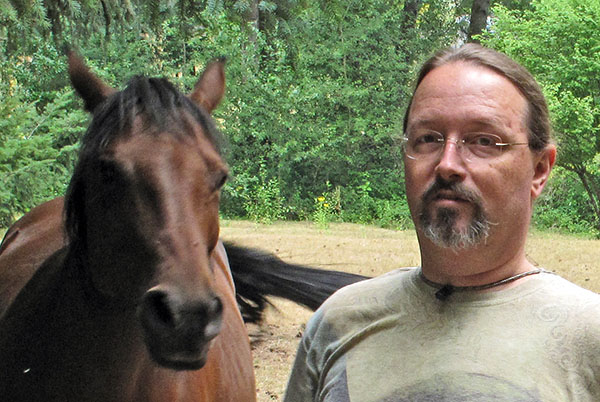
Marc Laidlaw was raised in Laguna Beach, California. His first novel, Dad's Nuke, was published in 1985, followed by such SF and horror novels as Kalifornia and The 37th Mandala. He became obsessed with computer games and, after interviewing the designers of Doom for an article in Wired, Laidlaw found his way into the game biz. He is now renowned as the lead writer in Valve Software's hit games in the Half-Life series.
"Deepscreen" is an excerpt from Laidlaw's legendary novel-in-progress, God Mode, which offers a SFictional view of the game industry
Post a comment on this story!